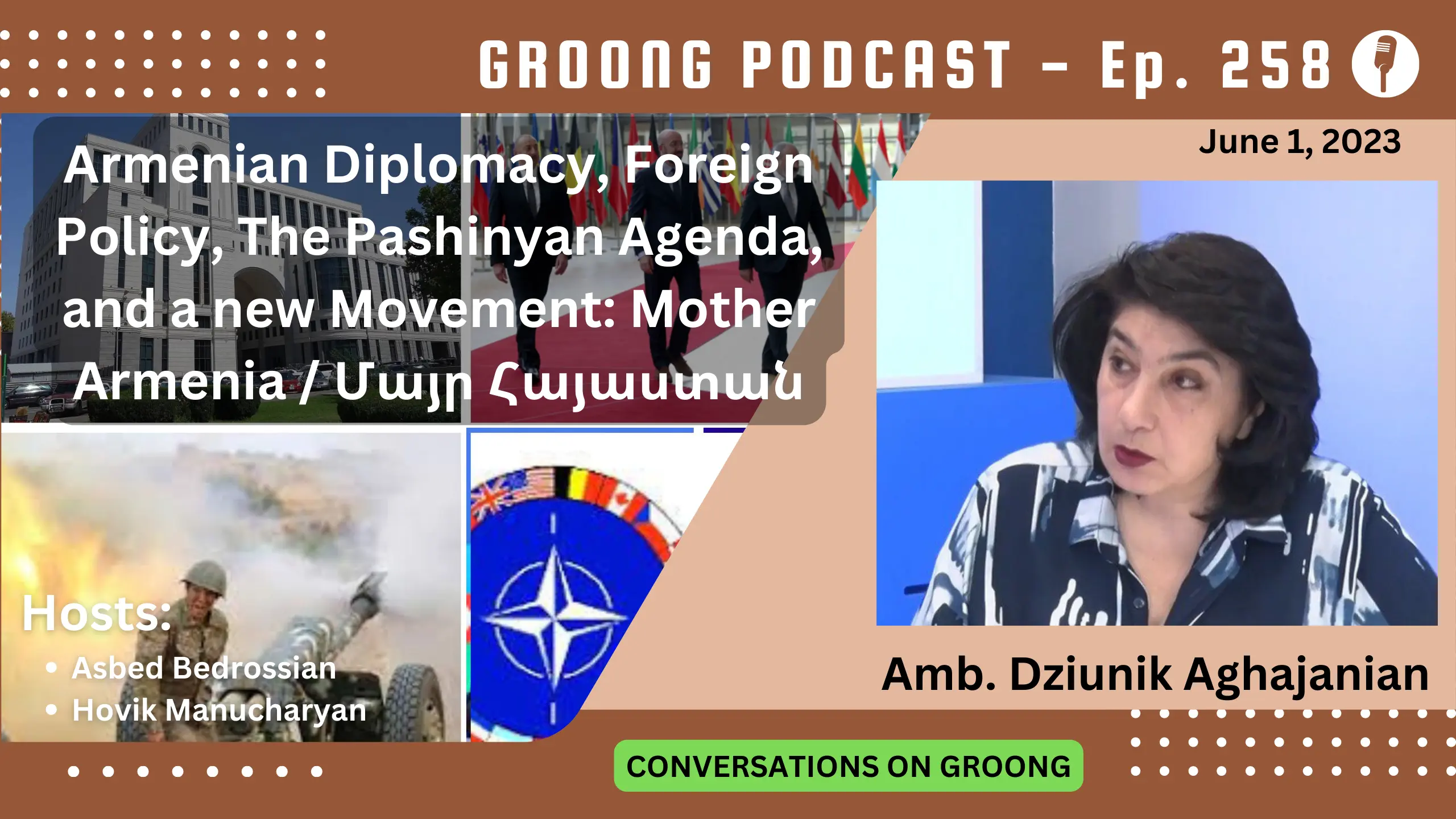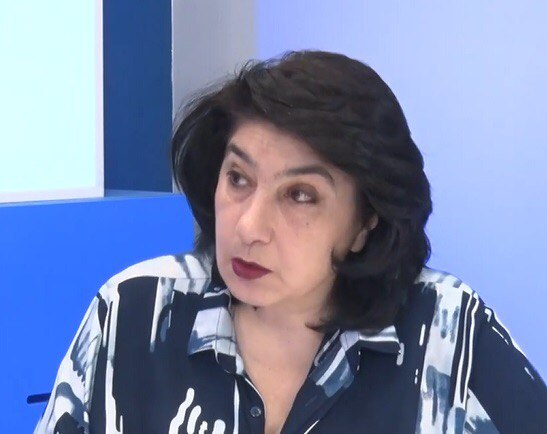
Dziunik Aghajanian - on Armenian Diplomacy, Foreign Policy, the Pashinyan Agenda, and Mother Armenia
Guest:
Topics:
- Intro to Ms Aghajanian
- Career path, Mentors, Influencers
- Parting ways with the MFA
- How did Armenia Resist Turkish Pressure prior to 2018
- Impressions of 2018 events
- On Pashinyan’s Policies to Surrender Artsakh
- Letter Planning the Surrender
- Messaging Aliyev to begin Instigations
- Changing Security Doctrine
- The Myth of Western Security Guarantees
- Pashinyan’s Fiction re Alma Ata and Madrid Principles
- On Armenia’s National Interests
- On Armenian Foreign Policy Vectors
- Can Armenia get Closer to Iran?
- Can “Normalization” with Turkey work?
- Mother Armenia / Մայր Հայաստան Movement Announced
Episode 258 | Recorded on Wednesday, May 31 2023
Show Notes
Diplomatic Career
Can you tell us a little about how you entered the career of a diplomat and where your career has taken you?
Questions:
- In over 30 years with the MFA, who were the most influential mentors and diplomats for you, and who impressed you the most?
- Genocide Policy: Zareh Sinanian.
- In July 2021, we heard that you were recalled from your ambassadorship to Indonesia, Malaysia and Singapore. Why did you leave the MFA? Was it voluntary or were you relieved?
Velvet 2018
Let’s look back to May of 2018, when Nikol Pashinyan was sworn in as Prime Minister of Armenia.
Questions:
- What were your impressions of Pashinyan’s movement at the time?
- What about 6 months later, or 12 months later?
Lead Up, During, and After the 44 Day War
Antebellum
2020 is obviously marked by the 44-day war. The infamous statement by Hitler comes to mind, in 1939, he is quoted as: “When diplomacy ends, war begins.”
Question:
- What were some of the major factors that led to the start of the war in 2020? How did Armenian diplomacy fail?
Since his defeat in the 44-day way, Pashinyan has at times claimed that Armenia agreed to handing Artsakh to Azerbaijan with the signing of the Alma Ata declaration in 1991. He has also claimed the same about Armenia agreeing to hand over Artsakh by signing the Madrid Principles.
Foreign Minister Vartan Oskanian has vehemently rebutted Pashinyan’s assertions, and has said also that he offered to Pashinyan and his administration to discuss and explain the details of the negotiations, but Pashinyan rejected everything prior to 2018 and said that he would start from his own starting point.
Question:
- What are your thoughts about Pashinyan’s claims about Alma-Ata, Madrid, and prior administrations having agreed to hand Artsakh over to Azerbaijan?
During The 44-Day War
Of course, the 44 day war was a pivotal moment for all of us, but please tell us how you experienced it from the inside, as an ambassador in Southeast Asia?
Questions:
- When exactly did you learn that the war had started?
- Was the war expected by the government?
- How would you evaluate the performance of the MFA during the war?
Postwar
As the war ended, Armenian society was in shock & disbelief. On the night of the signing of the November 2020 trilateral ceasefire statement, people stormed the government building and parliament. For a week, neither Pashinyan nor his Civil Contract parliamentarians could be found.
Question:
- What did it look like from within the MFA?
At one point, when foreign minister Zohrab Mnatsakanyan resigned, four of his deputy FMs also resigned en masse. At this time there were a lot of concerns that the ministry no longer had qualified or trained diplomats and staff to carry on its mission.
Questions:
- Why did Mnatsakanyan resign? How would you evaluate his performance?
- Were the concerns about the ministry’s ability to carry on justified?
- Where does one’s responsibility as a diplomat end and that of a citizen begin?
East vs. West
We are now apparently in the midst of a “great game” for control and influence over Armenia, and the South Caucasus. Immediately after the war, the Pashinyan government made it very difficult to evaluate the direction of Armenia’s geopolitical vector. One day it was praise of Russia and strong pro-Russian sentiments, other days we saw overtures towards the west.
In geopolitics they say that countries don’t have friends, they have interests, or national interests.
Questions:
- What are Armenia’s fundamental interests?
- Serge Sargsyan’s administration had a policy of complementarity, that of balancing our relations with our eastern and western partners. Should Armenia look East? West? Should it look both ways? Or should it look elsewhere?
- Can Armenia get closer to Iran without facing sanctions? Should it care?
Relations with Turkey
We brushed on the topic of Genocide earlier in the show. We should note that …
For over 100 years, the west has made many promises to Armenia which they have mostly not kept. In general, the west can not exert influence in the South Caucasus, except through Turkey, and we know that those relations are blocked.
Question:
- What are your thoughts about unblocking relations with Turkey? Do you think that the Turkish-Armenian so-called “normalization” process, as pursued by the Pashinyan government, will be beneficial for Armenia?
Mother Armenia Movement
On May 28th, you and a number of other citizens joined forces to announce the founding on a new movement called Mother Armenia - Մայր Հայաստան.
Questions:
- What are the movement’s political goals?
- The movement is advertised as above the political spectrum.
- Have you received any support from existing opposition parties?
Wrap-up
That concludes this Conversations On Groong episode**. **As always we invite your feedback, Thanks to Laura Osborn for the music on our podcasts. Don’t forget to subscribe to us on YouTube, Twitter, and Facebook.
Guests

Dziunik Aghajanian
Ms. Dziunik Aghajanian has served Armenia through the ranks of the Ministry of Foreign Affairs, and most recently as a diplomat, as Armenia’s Ambassador to such countries as the Netherlands, Malaysia, and Indonesia. She received her education at Yerevan State University, Columbia University in NY, and Uppsala University in Sweden.
Hosts

Asbed Bedrossian
Asbed Bedrossian is an IT professional, and for years oversaw the central IT enterprise infrastructure and services at USC. His decades of experience spanned across IT strategy, enterprise architecture, infrastructure, cybersecurity, enterprise applications, data center operations, high performance computing, ITSM, ITPM, and more.
Asbed founded the Armenian News Network Groong circa 1989/1990, and co-founded the ANN/Groong podcast in 2020.

Hovik Manucharyan
Hovik Manucharyan is an information security engineer who moved from Seattle to Armenia in 2022. He co-founded the ANN/Groong podcast in 2020 and has been a contributor to Groong News since the late 1990s.
Disclaimer: The views expressed by Hovik Manucharyan on the ANN/Groong podcast are his own and do not necessarily reflect the opinions of his employer or any other organization.